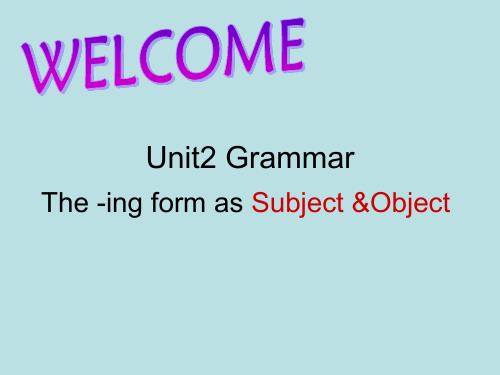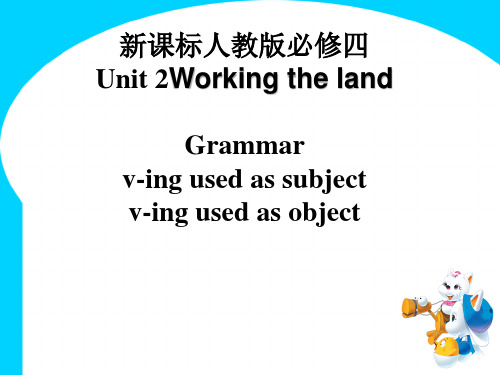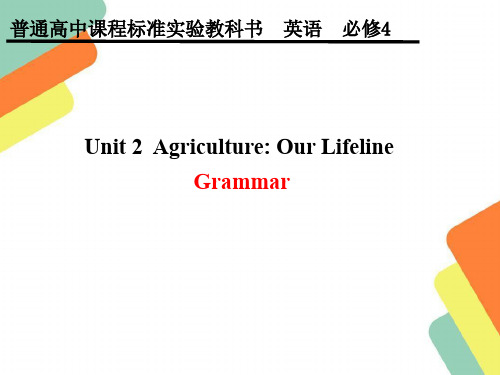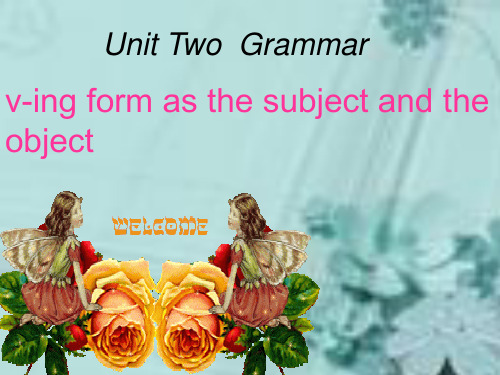- 1、下载文档前请自行甄别文档内容的完整性,平台不提供额外的编辑、内容补充、找答案等附加服务。
- 2、"仅部分预览"的文档,不可在线预览部分如存在完整性等问题,可反馈申请退款(可完整预览的文档不适用该条件!)。
- 3、如文档侵犯您的权益,请联系客服反馈,我们会尽快为您处理(人工客服工作时间:9:00-18:30)。
2. 动词-ing形式作主语时常后置, 用it作形 式主语,用形容词或名词作表语。常见 的作表语的名词或短语有:no use, no good, fun, hard work, a hard / difficult job, a waste of time等。如: Is it worthwhile quarrelling with her? It’s no good waiting here. Let’s go home. It was a waste of time reading that book.
7. 动词forget, go on, mean, regret,
remember, stop, try, be used to, can't
help后跟动名词和跟不定式区别较大,须
注意。
forget, regret, remember后跟动名词
表示已经发生的动作;后跟不定式表示将 要发生的动作。
避免错过继续练, avoid, miss, keep /keep on, practise
否认完成停能赏, deny, finish, stop, enjoy / appreciate 不禁介意准逃亡, can’t help, mind, allow/ permit, escape
不准冒险凭想象。 forbid, risk, imagine
ready will be of great help. A. To have had C. Have B. Having had D. Having
14. The parents suggested ____ C in the
6. We are both looking forward to __ next week. A. going on vocation(休假)
B. go on vocation
C. be going on vocation
D. have gone on vocation
7. You must pay attention to ___ the works of Lu Xun. A. read B. reading C. reader D. be read 8. You should work tonight instead of _____ TV. A. to watch B. you watching C. you watch D. watching
4. Though it sounds a bit too dear (昂 贵), it is worth ______. A. being bought B. buying C. to buy D. to be bought 5. He devoted his life to _____ the atomic theory. A. study B. be studied C. studying D. have studied
一、动词-ing形式作主语 1. 动词-ing形式作主语表示经常性、习 惯性的动作, 或抽象的、泛指的动作, 谓语动词用单数。如: Reading aloud is very important for us to learn a foreign language. Going to bed early and getting up early is considered to be a good habit.
His coming home late worries his mother.
Mary’s being late for class made her
teacher very angry.
2. 动词-ing形式的否定形式是在其前面加 not,带有逻辑主语时not应在动词-ing 形式之前。如: Not cleaning her teeth made her smell bad. Your schoolmate’s not coming home in time made her parents worried. His/Jack's not getting to the station on
The –ing form as the Subject and Object 动词-ing形式作主语和宾语
1. 动词-ing形式是在动词末尾加 -ing,
属于非谓语动词。如:do-doing,
write- writing , sit-sitting , etc.否定 形式:not+ v--ing 构成. 2. 动词-ing形式作主语或宾语时,也 可称为动名词。
9. The microscope is used for__ minute
(微小的) objects.
A. examining C. examined night. A. to stay C. to staying B. stay D. staying B. being examined D. examine
10. Mike has got used ___ up late at
11. The patient must be separated to
avoid (避免) ____ others.
A. being infected(感染) B. infecting
C. to infect A. washed
go on doing 继续做原来做的事
go on to do 接着做另一件事 mean doing 意味着要做某事
mean to do 打算做某事
stop doing 停止做某事
stop to do 停下来(别的事)开始
做某事
try doing 试着做某事 try to do 努力做某事 be used to doing 习惯于做某事 be used to do 被用来做某事 can't help doing 禁不住做某事
can't help to do 不能帮助做某事
[注意] 1. 动词-ing形式的复合结构是指在动词ing形式前面加上逻辑主语来强调动作 的执行者,该逻辑主语常为形容词性 物主代词或名词所有格;当逻辑主语 不出现在句首时,可用人称代词的宾 格代替形容词性物主代词或用名词普 通格代替名词的所有格。如:
5.在形容词worth后用动名词,且与句 子主语有逻辑上的动宾关系,但这个 动名词需用其主动式表示被动意义。 The film is worth seeing. 这部电影值得看。 The place is worth visiting. 那个地方值得游览。
6. 在allow, advise, forbid, permit后直接 跟动名词作宾语 (allow/advise/forbid/permit doing sth.), 跟不定式作宾补 (allow/advise/forbid/permit sb. to do sth.) eg. We don't allow smoking here. We don't allow anybody to smoke here.
以下的动词后面既可接动词的不定式又可 以接动词的ing作宾语: hate, love, prefer, begin, start, like, hate, dislike, continue, remember, forget, regret, try, stop, mean
练习:
1. Keep on ____ and you will succeed. A. a try C. triing A. he should go C. his going B. try D. trying B. he go D. him to go
2. His parents insist on ___ to college.
3. The story was so funny that we ___. A. couldn’t help laugh B. can’t but laugh C. couldn’t help laughing
D. couldn’t help but to laugh
需要注意的问题: 以下的动词后面加动词的不定式作宾
语:
decide, hope, expect, seem, agree, afford, arrange, choose, offer, plan, promise, determine, demand, manage, fail, prepare, refuse, pretend
C. to wash
D. infected B. to be washed
D. being wneed ______.
13. It’s necessary to be prepared for
a job interview. D ____ the answers
不定式做主语往往表示具体的特别是将来的
动作。如:
It's no use crying over spilt milk.
覆水难收。 (指抽象动作)
He realized that to go on like this was
wrong.
(指具体动作)
二、动词-ing形式作宾语 1. 有些动词如admit, advise, appreciate, avoid, consider, delay, deny, enjoy, escape, excuse, fancy, finish, forbid, imagine, mind, miss, practise, risk, suggest等后能接动词-ing形式作宾语, 而不能接动词不定式。如: We’re considering paying a visit to the Science Museum.
Do you mind my/me/Jack's /Jack leaving now? I’m annoyed about John’s/John forgetting to pay. I really can’t understand your/you treating





